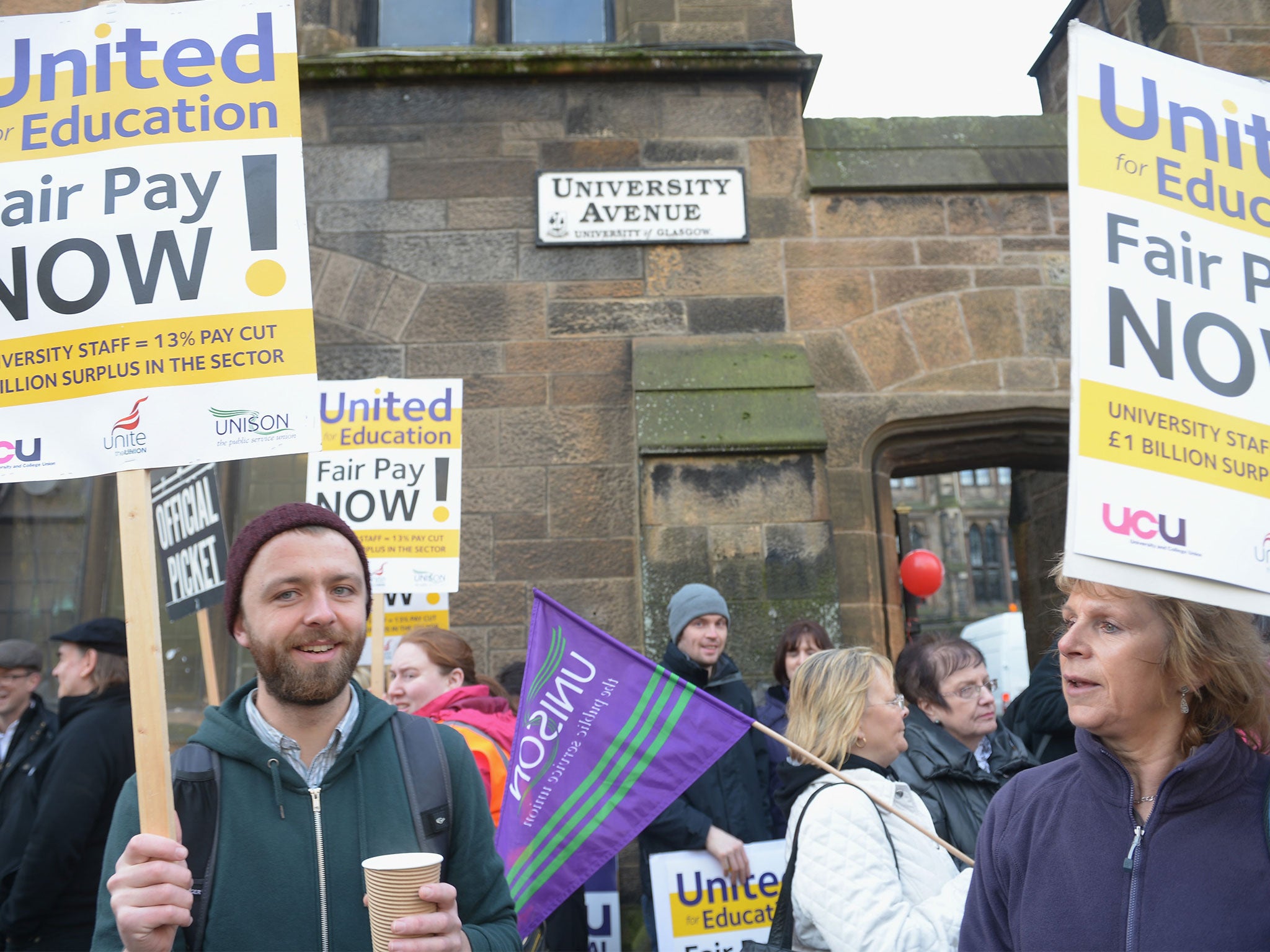University staff confirm strike action with threat to boycott marking students' work
Up to 60,000 higher education staff members are expected to take part in the nationwide strike, although unions say students are unlikely to be affected

Your support helps us to tell the story
From reproductive rights to climate change to Big Tech, The Independent is on the ground when the story is developing. Whether it's investigating the financials of Elon Musk's pro-Trump PAC or producing our latest documentary, 'The A Word', which shines a light on the American women fighting for reproductive rights, we know how important it is to parse out the facts from the messaging.
At such a critical moment in US history, we need reporters on the ground. Your donation allows us to keep sending journalists to speak to both sides of the story.
The Independent is trusted by Americans across the entire political spectrum. And unlike many other quality news outlets, we choose not to lock Americans out of our reporting and analysis with paywalls. We believe quality journalism should be available to everyone, paid for by those who can afford it.
Your support makes all the difference.University staff from across the UK have confirmed plans for two days of strike action this week following an on-going dispute over pay.
Up to 60,000 members of the University and College Union (UCU) will stage a walk-out on Wednesday May 25 and Thursday May 26 in protest over an ‘insulting’ offer of a 1.1 per cent pay rise from university representatives association UCEA.
Staff have also agreed to begin working to contract – meaning they will refuse to work overtime, set additional work or undertake extra duties such as covering classes for absent colleagues.
If no agreement is reached in the coming weeks, higher education members across the union – which represents over 110,000 academics, lecturers, researchers and other staff working in the industry – have pledged to take further strike action.
Concerns have been raised that the strike action could eventually affect graduation ceremonies and the clearing and application process for next year’s students. The union has said it is also beginning preparations for a boycott of the setting and marking of students’ work this autumn.
Union representatives have argued that universities could afford to pay more than the proposed increase of 1.1 per cent, which “does little” to address a real-terms pay cut of 14.5 per cent since 2009.
UCU general secretary, Sally Hunt, said: ‘The pay offer is an insult to hardworking staff, especially in light of the 5 per cent pay rise vice-chancellors have enjoyed while holding down staff pay.”
“Members have made it clear that they won’t tolerate a continued squeeze on their income, pay inequality and the increasing job insecurity blighting the sector.”
The union has also called for universities to commit to closing the gender pay gap and reducing the proportion of staff on casual and zero-hour contracts. On average, female academics across the sector are still paid £6,103 per year less than male counterparts, despite a reported 2.4 per cent fall in the pay gap overall last year.
MS Hunt said: “It’s time to invest properly in the teachers, researchers and administrators who are the backbone of our universities. Industrial action which impacts on students is never taken lightly, but members feel that they have been left with no alternative.”
“If the employers wish to see a swift end to this dispute, and avoid further disruption, they need to come back to the table with a much-improved offer.”
As well as the two-day walkout, protests are planned around the UK with rallies taking place in Belfast, Birmingham, Brighton, Cambridge, Glasgow, Leeds, Liverpool, London, Manchester, Newcastle and Sheffield.
The UCEA said their higher eduation institutions anticipated "minor impact and minimal student disruption" as a direct result of the strike action, since many students will already be finished their work for the academic year.
In a statement, the association confirmed that it had met with members of the higher education trade unions and had agreed to continue working to improve the gender pay gap and casual working arrangements for staff.
A spokesperson from the group said: "This industrial action is naturally disappointing given the very good pay offer, plus the joint work on gender pay and casual employment that is on the table. We would like to see UCU consulting its members on the final offer rather than seeking to take action that could damage institutions and harm their students."
Last week, Professor Sir Paul Curran, Chair of UCEA, said n light of on-going pay discussions: “Having listened, considered and responded to the trade unions on all aspects of their claim the employers remain committed to the fair final offer they have made.”
“We have explained that this offer is at, and for some beyond, a limit of affordability for HE institutions and the very best offer that will be available this year.”
“All we seek now is for all the trade unions to put this offer to their members in full and within the context of a financially challenging year. All parties I’m sure share an interest in reaching a settlement that is both fair and sustainable for institutions, their staff and students.”
Join our commenting forum
Join thought-provoking conversations, follow other Independent readers and see their replies
Comments